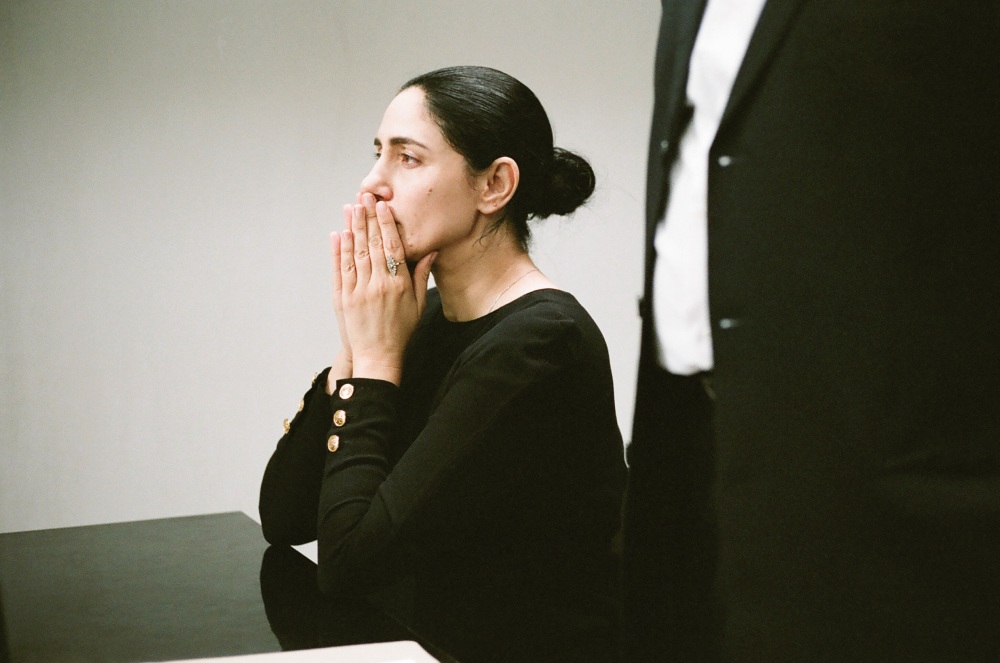Though TIFF & NYFF are over, London and Chicago Fests are still raging. We will have a few reports from each to cover more Oscar Submissions for Best Foreign Language Film. Here's our London friend David on Israel's Oscar submission.
It's your right, but it's not your choice."
We're in an Israeli rabbinical courtroom, and Viviane Amsalem wants a divorce. Absolutely, say the judges, no problem - as long as your husband agrees. He doesn't. Viviane will spend years returning to this courtroom, and the audience will spend two hours trapped in it with her, absurdity and desperation rising and falling as we skip forward in time, the temporal intertitles ('Four Months Later') quickly accumulating a farcical impression that's only tempered by the occasional grave addendum of how many years these shifts have accumulated to. Laughter comes because the reality of the situation is too archaic to believe.
 Ronit Elkabetz writes, directs and stars as Viviane
Ronit Elkabetz writes, directs and stars as Viviane
Gett - The Trial of Viviane Amsalem is a social justice picture, make no mistake. Though delivered with a healthy dose of humour, the undercurrent of the picture is bitter outrage, as a very simple message is strung out to breaking point. Viviane is almost constantly surrounded by men: her sympathetic, dogmatic lawyer Carmel Ben Tovim, the three impatient judges, her husband Elisha. For much of the film, director-writer-actress Ronit Elkabetz carries Viviane with a quiet dignity, seething with an awareness that the best way to her goal might be to let the men fight for it. When she does speak, it is not cowed and submissive or (initially) passionately angry; her first big speech is delivered with such measured power that the judges are visibly taken aback in involuntary respect.
 With its settings restricted to the courtroom building, Gett could easily have ended up feeling like a staid stage play, but instead it oozes with a claustrophobia more mental than physical; the audience is trapped with Viviane in this cyclical nightmare, never granted any view of how her marriage exists outside of the courtroom. That's because, quite simply, that isn't the point; the men spend hours deliberating over why she deserves a divorce, over what her husband could possibly done to cause this, but the only necessary reason for Viviane to be granted a divorce should be because she wants one. No more, no less. The further into the film we get, the more painful it becomes, as every last drop of emotion is wrung from Viviane as she pleads, cries, begs for her request to be granted.
With its settings restricted to the courtroom building, Gett could easily have ended up feeling like a staid stage play, but instead it oozes with a claustrophobia more mental than physical; the audience is trapped with Viviane in this cyclical nightmare, never granted any view of how her marriage exists outside of the courtroom. That's because, quite simply, that isn't the point; the men spend hours deliberating over why she deserves a divorce, over what her husband could possibly done to cause this, but the only necessary reason for Viviane to be granted a divorce should be because she wants one. No more, no less. The further into the film we get, the more painful it becomes, as every last drop of emotion is wrung from Viviane as she pleads, cries, begs for her request to be granted.
Elkabetz and sibling co-director Shlomi Elkabetz marry this torturous process with a smart tone of absurdist comedy; the judges, in particular, provide an abundance of weary amusement as they become increasingly impatient with the process themselves. Ultimately, though, it is with searing vitriol that the ludicrous indignity of the Jewish laws are held up to face charges; as Ronit Elkabetz put it in the post-screening Q&A, it seems incredible that such situations continue to exist "in a country that is called a democracy".
Gett - The Trial of Viviane Amsalem screened as part of the 58th BFI London Film Festival.
Oscar submission charts here.
17 Foreign Oscar Submissions Reviewed:
Argentina, Australia, Belgium, Brazil, Canada, Cuba,France, Germany, Iceland, Israel, Latvia, Mauritania, Norway, Poland, Portugal, Sweden and Venezuela